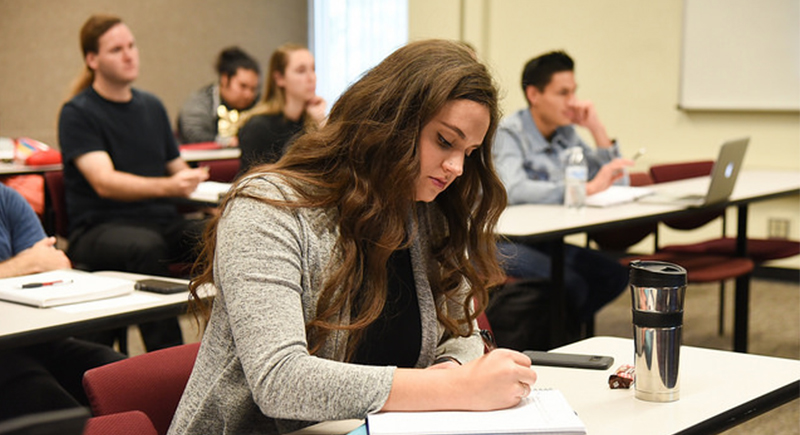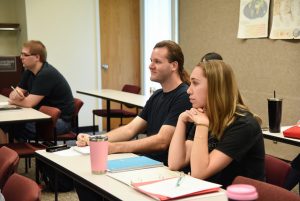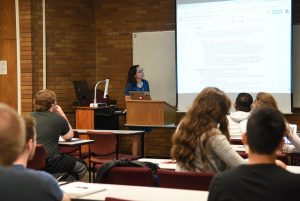
September 7, 2018 Students gain real-world experience in technical writing after partnering with local businesses
By Maegan Murray, WSU Tri-Cities
RICHLAND, Wash. – A technical writing course at Washington State University Tri-Cities partnered with local businesses and organizations to produce documents ranging from manuals, to booklets, to instruction guides. This opportunity allowed students to hone the skills they cultivated throughout the course to fulfill a real-world business need.

Students in an English course listen as Vanessa Cozza, clinical assistant professor of English, instructs students in the course. Student Tommy Schmick, center, was one of the students who partnered with a local organization for a technical writing project in Cozza’s technical writing course.
Vanessa Cozza, clinical assistant professor of English and instructor of the course, said the goals with the project were to provide students with a real-world opportunity that would add value back into their own community, while offering them a tangible example they could use in the future for their professional careers.
“Knowledge in technical writing is necessary to advance speaking and writing skills beyond academia,” she said. “While some careers might require it more than others, technical writing encompasses what professionals need to know to communicate effectively. Business owners or employees, for instance, most likely have to be familiar with different types of manuals, handbooks, or user guides. I wanted to provide my students with an opportunity to build something that would be used in the real-world.”
Partnering with local companies
The 17 students in the class partnered with the following organizations to create the following projects:
- Gravis Law – Writing a guide for a component of the firm’s software, which focuses on guiding attorneys through the timekeeping function of the program.
- Fuse – Creating a playbook with information on Fuse’s Launch Weekend event. The document focused on outlining different stages of the event, as well as providing a schedule to guide event organizers.
- Solar Spirits – Drafting components of an operations manual for the training of new employees, which included a safety guide and information covering all stages of production and product sales.
- Rebuilding Mid-Columbia (RMC) – Creating three templates to assist board members with the grant writing process, which consisted of a letter of inquiry, a cover letter and a frequently asked questions (FAQ) document.
- Fuse – Producing content for Fuse’s website, which included information on their State of Motion nonprofit organization that provides services and funds for new businesses, as well as seed funding and events.
Value of real-world opportunities
Student Shannon Horne and her group worked with Rebuilding Mid-Columbia to develop two templates to assist RMC with the grant proposal writing process.
“It was a great opportunity to work with RMC,” she said. “I definitely felt motivated to create a quality product since I knew they trusted us with such a key element of their organization. The skills taught in this course are highly valuable and applicable to professionals in all fields. They definitely apply to my daily work.”
Student Liz Brager and her group worked with Fuse to write information for their “State of Motion” non-profit website. She said the project forced them to problem-solve in order to create content for areas that they didn’t have a background in or provided previous knowledge of.
“Our team divided up the work, but supported each other, which helped a lot,” she said. “We learned what we were working on while we were working on it.

Professor Vanessa Cozza instructs her students as part of an English course at WSU Tri-Cities.
That’s a difficult, but sometimes important, skill in the workplace. I think the project, itself, has value because people will hopefully be able to understand what State of Motion is and how it can benefit them.”
Cozza said upon presenting their projects to their respective organizations, many of the company representatives were quite impressed with the students’ work.
“Watching one group’s presentation, I noticed that the client had a big smile on his face,” Cozza said. “The clients will further develop what the students did, as most of them needed a skeleton or a blueprint to get them started. Others will take the content that the students put together and add it to their website.”
Ideal work flow and partnership
Crystal Carter, co-founder and executive director of Rebuilding Mid-Columbia, said she was impressed with the students’ professionalism and end product. She said having student support for their small organization proved to be incredibly valuable.
“We are a very small organization – we have eight people on our board and one staff person,” she said. “To coordinate our projects, and in working with the city and finding volunteers, it is pretty time consuming. So to have the students come alongside us and deal with a portion of that administrative work load was truly a benefit and a blessing to this organization.”
Carter said she hopes that the partnership will continue for years to come.
“We were very pleased with the results of the project and the students’ work,” she said. “The students did a fantastic job.”
Many students said they were thrilled to use what they had learned in the course and apply it to a real-world setting where their developed materials would be utilized and expanded upon.
“The course provided valuable instruction regarding technical writing, the overall writing process and how to market and tailor it to your audience, which are applicable across all disciplines,” Horne said. “The project was an excellent opportunity to apply what we learned in a real-world format, which is invaluable. We received extensive positive feedback from the organization, which was rewarding, as well as motivating, when finalizing our product for final submission.”





